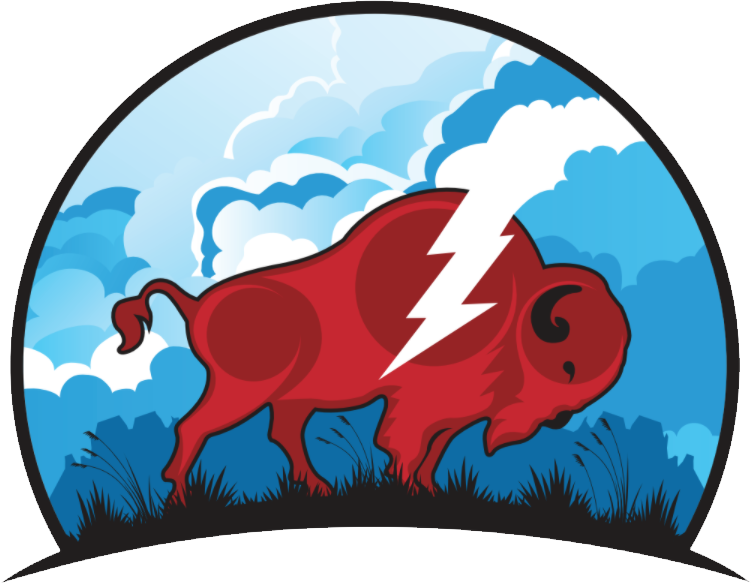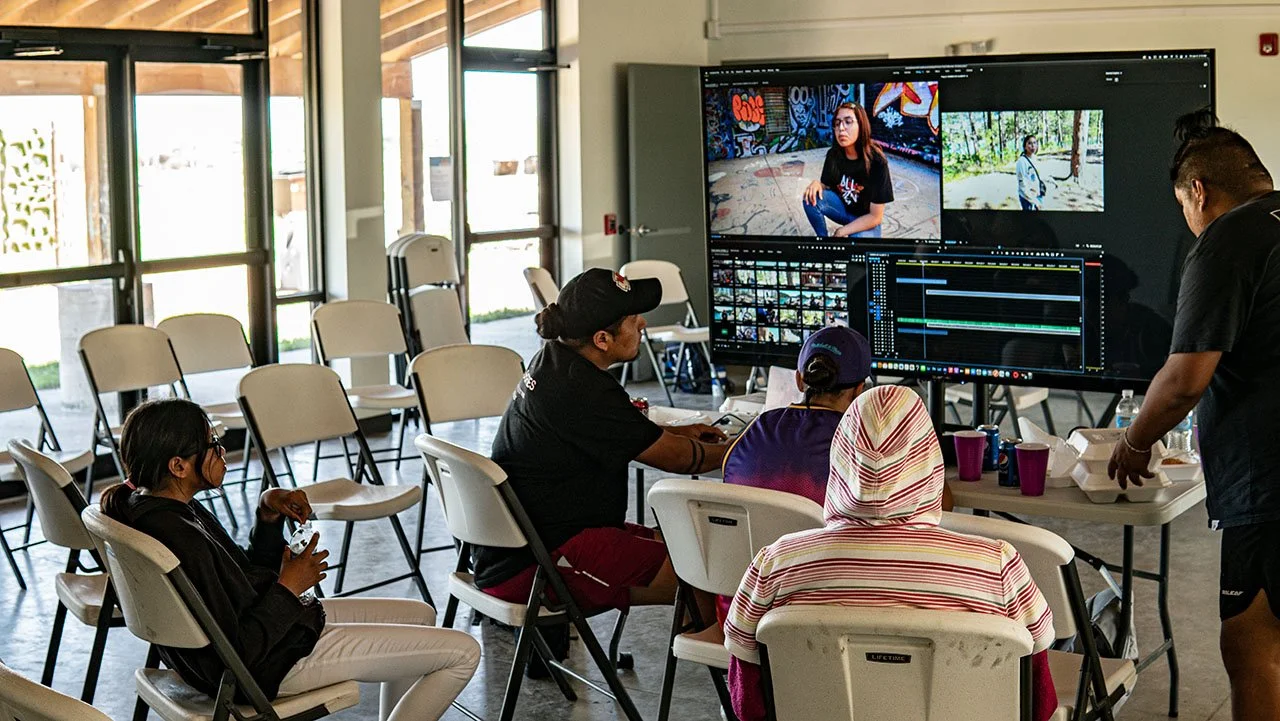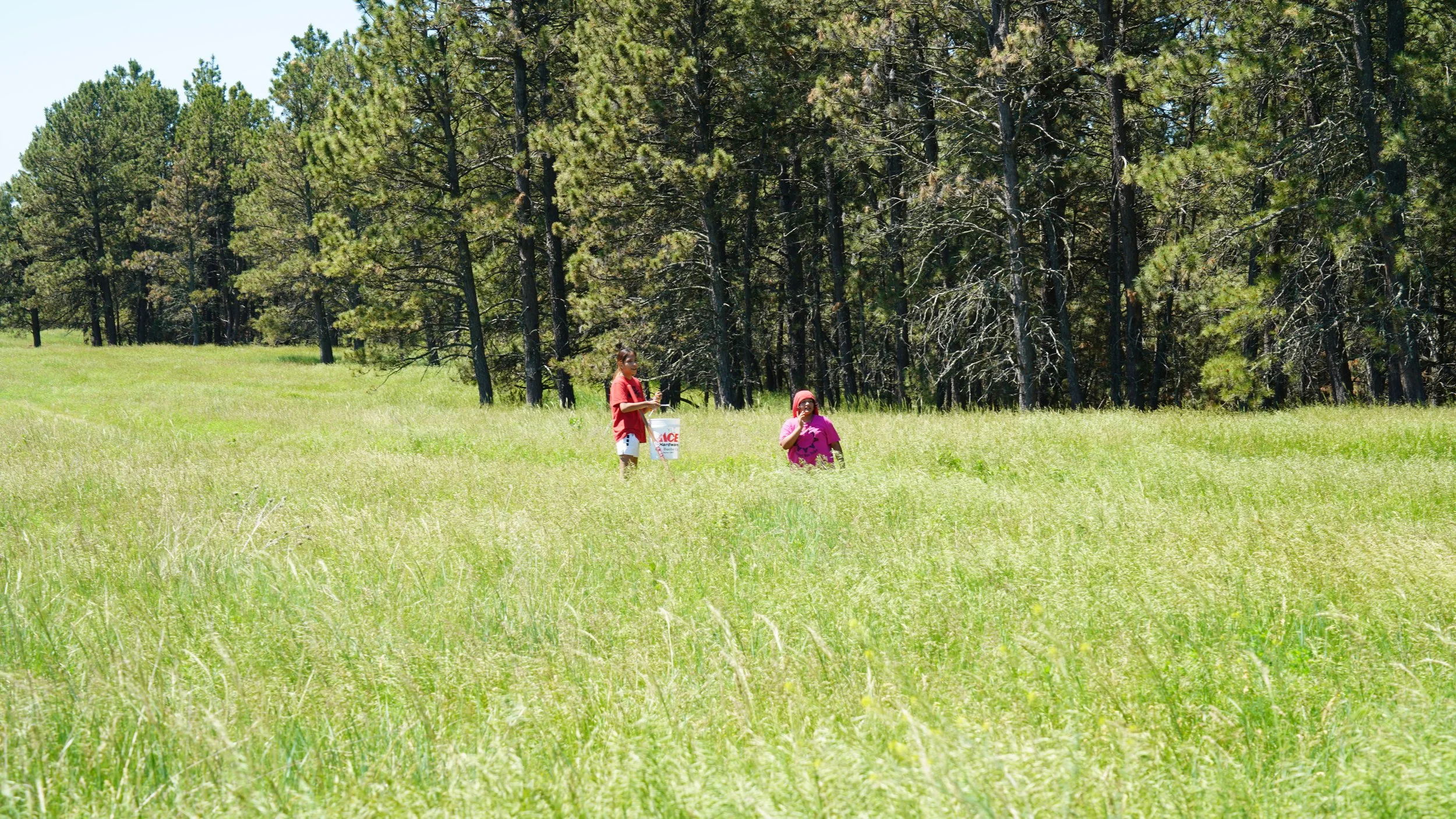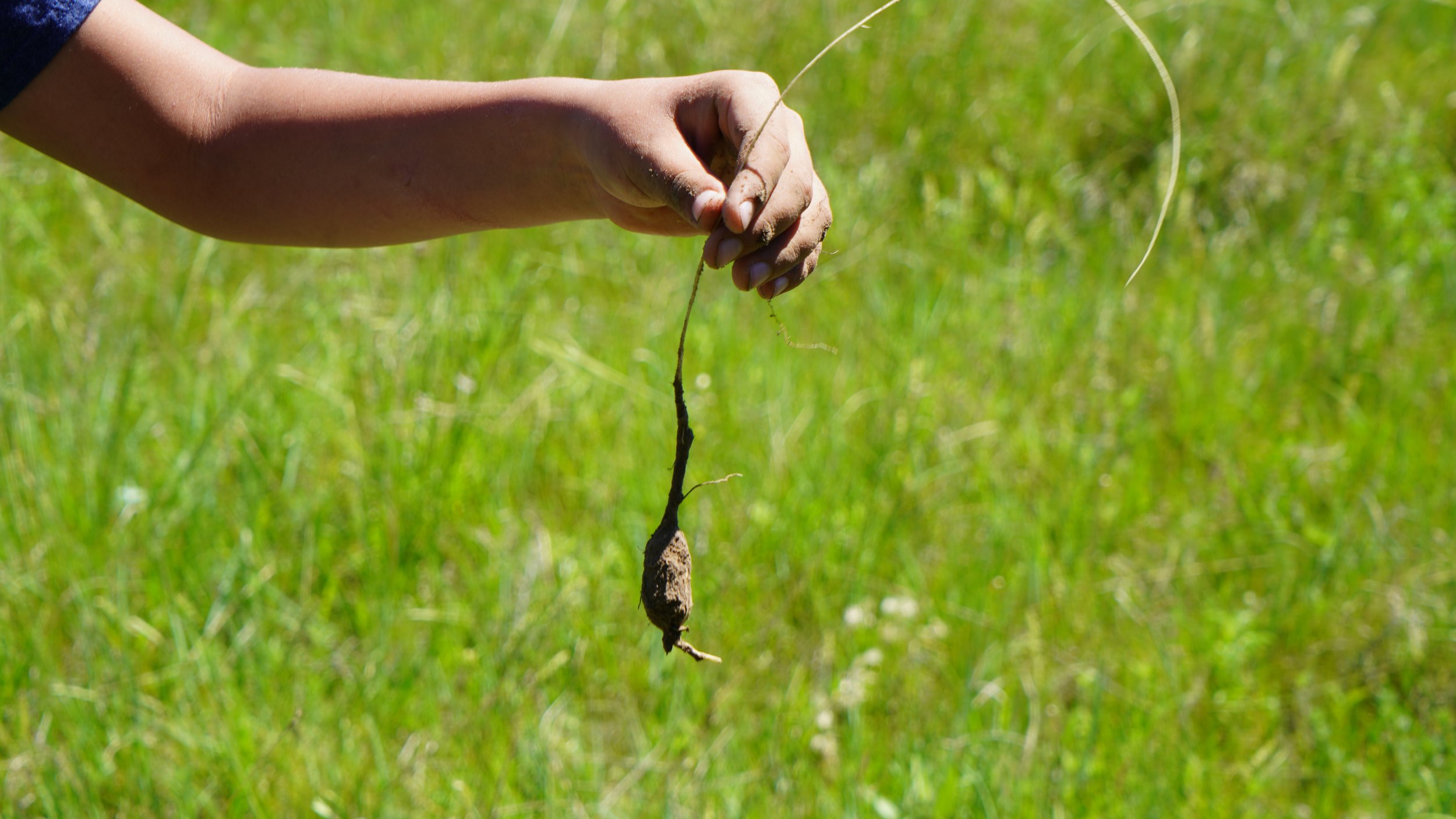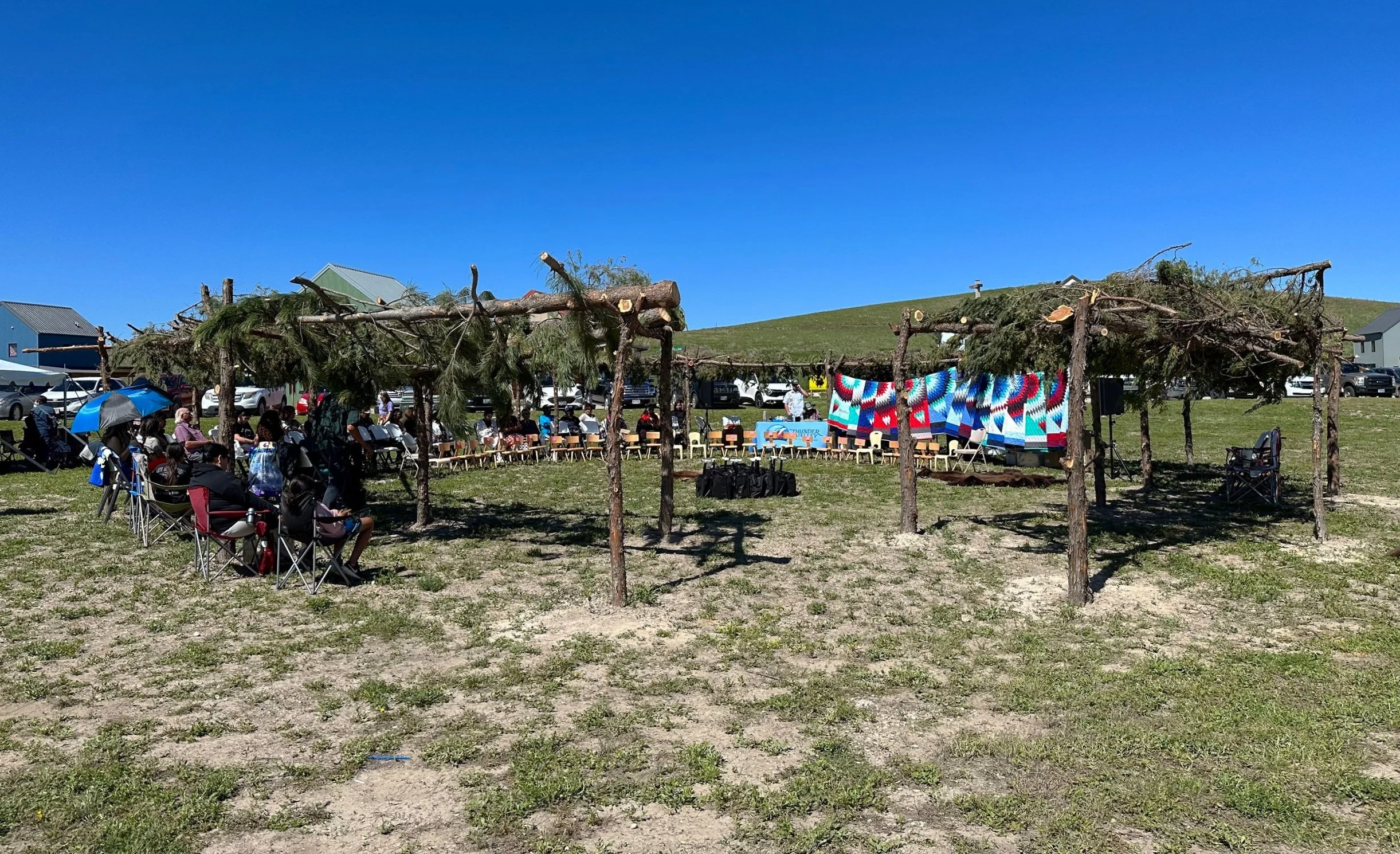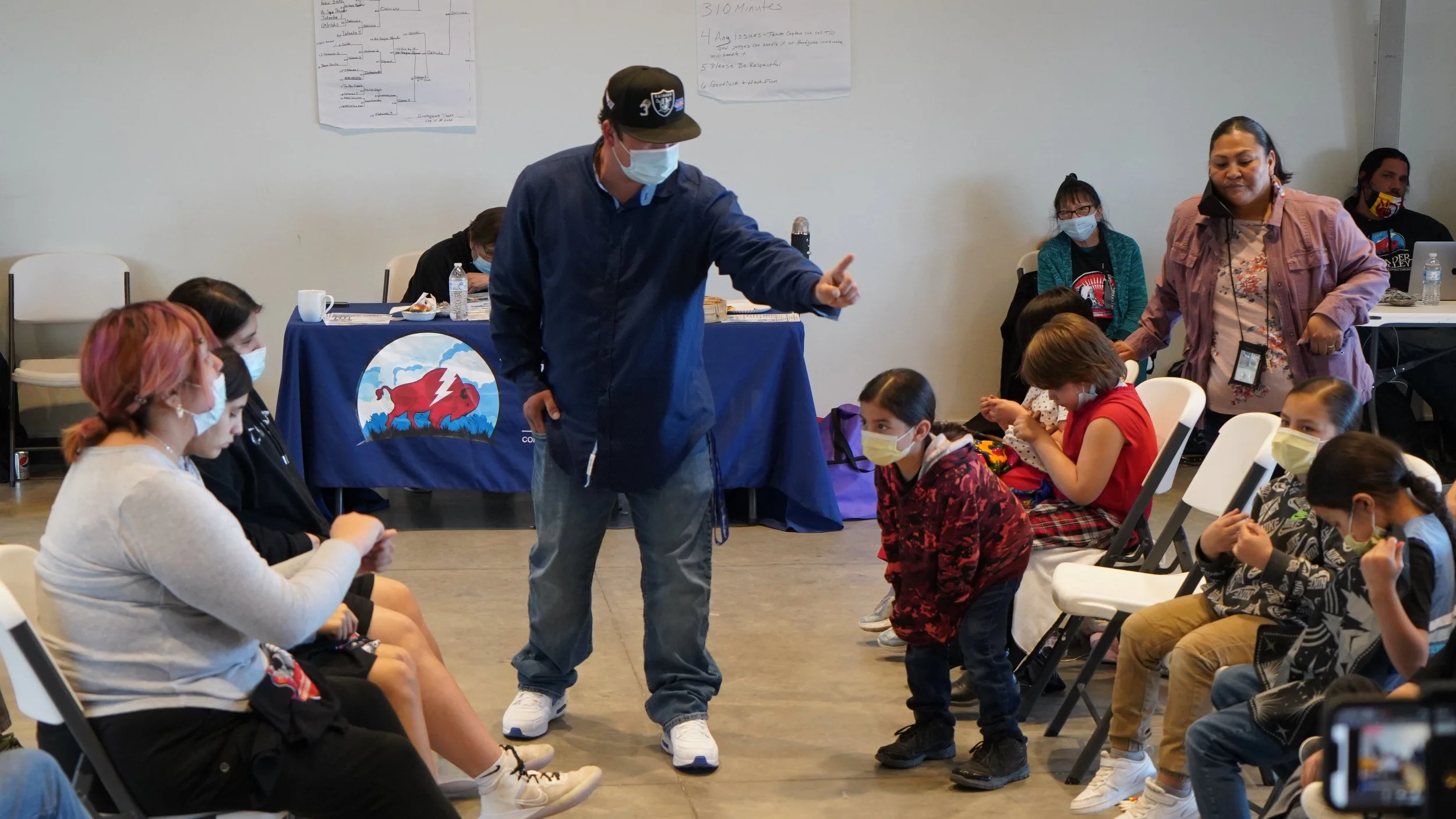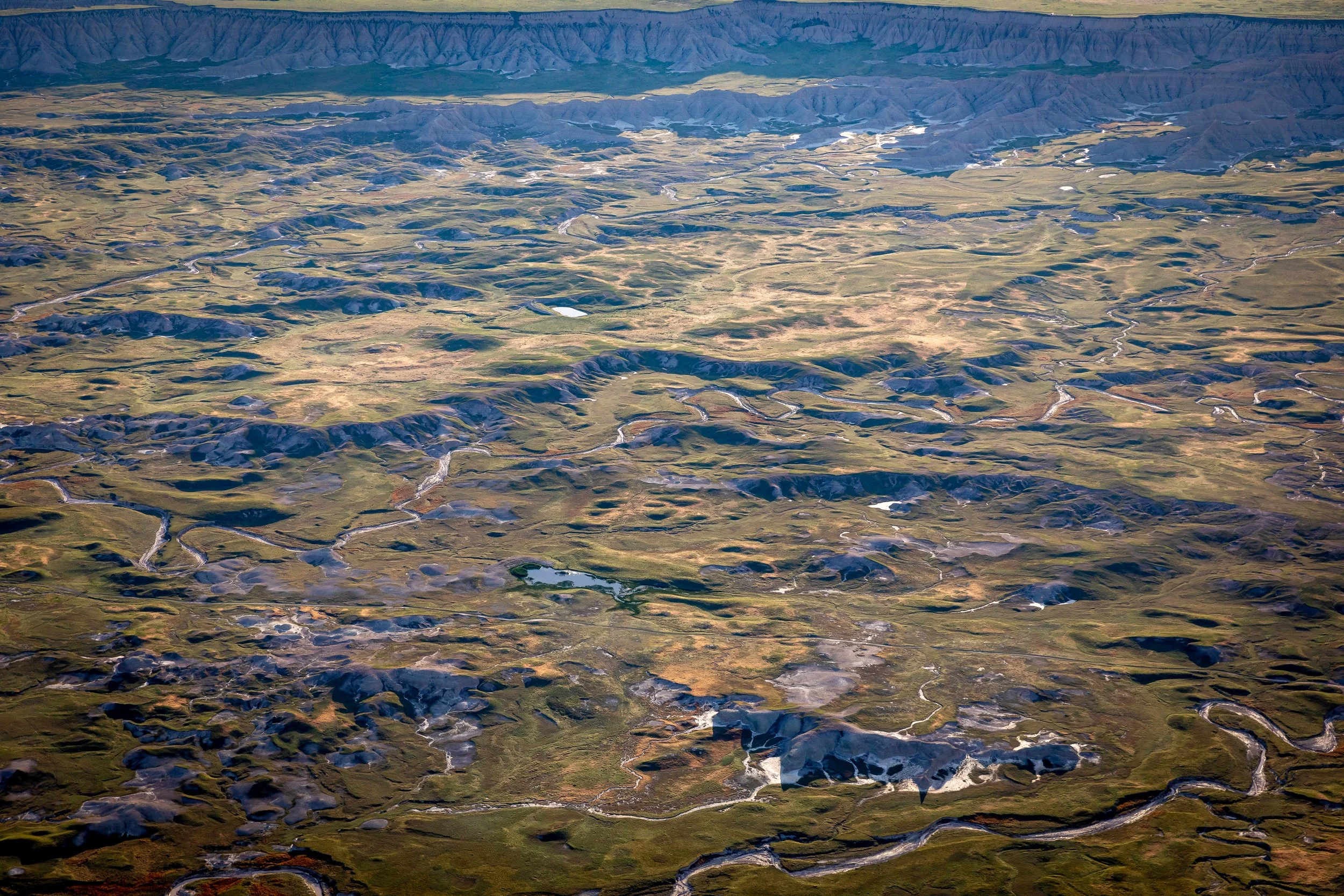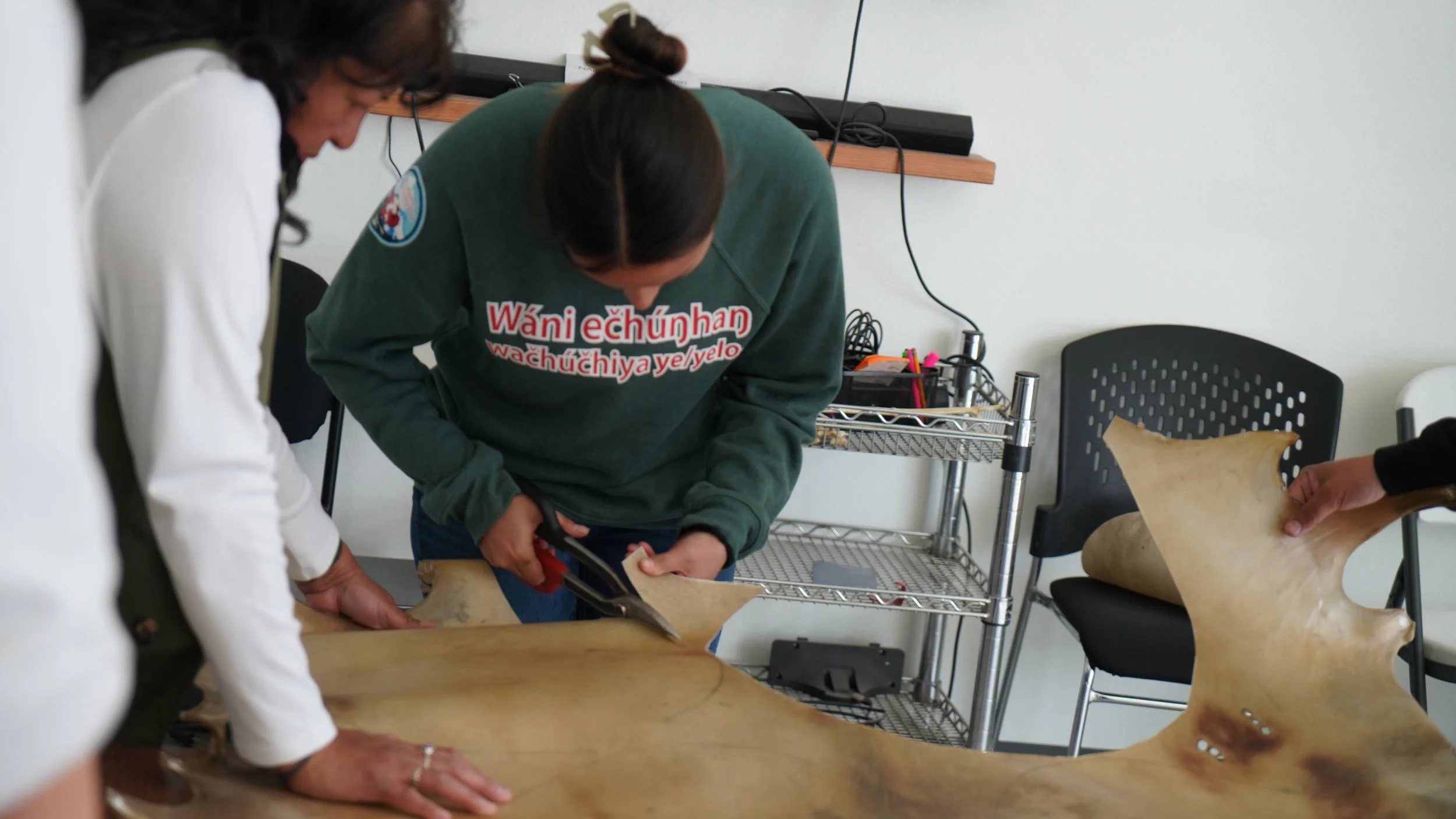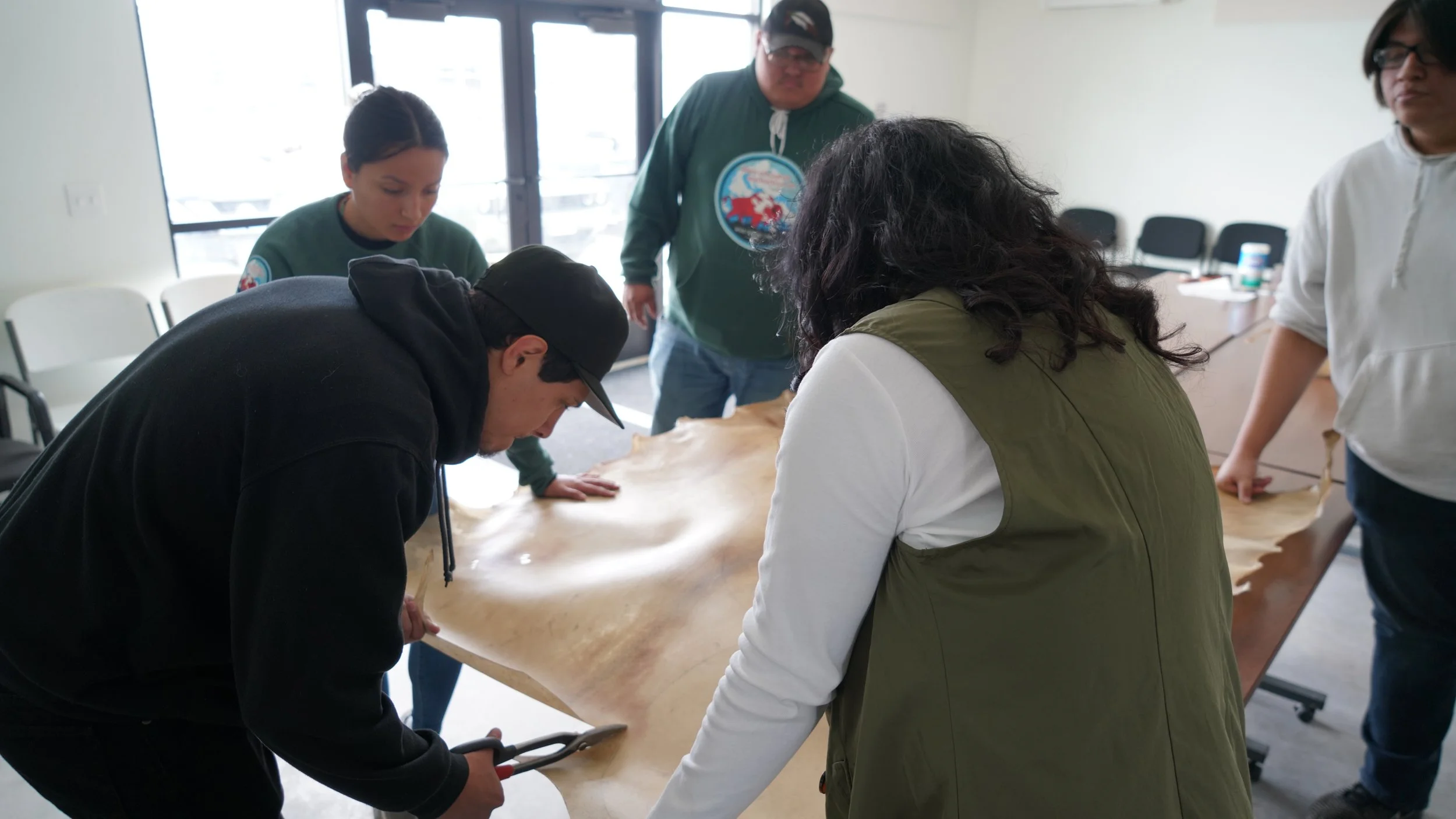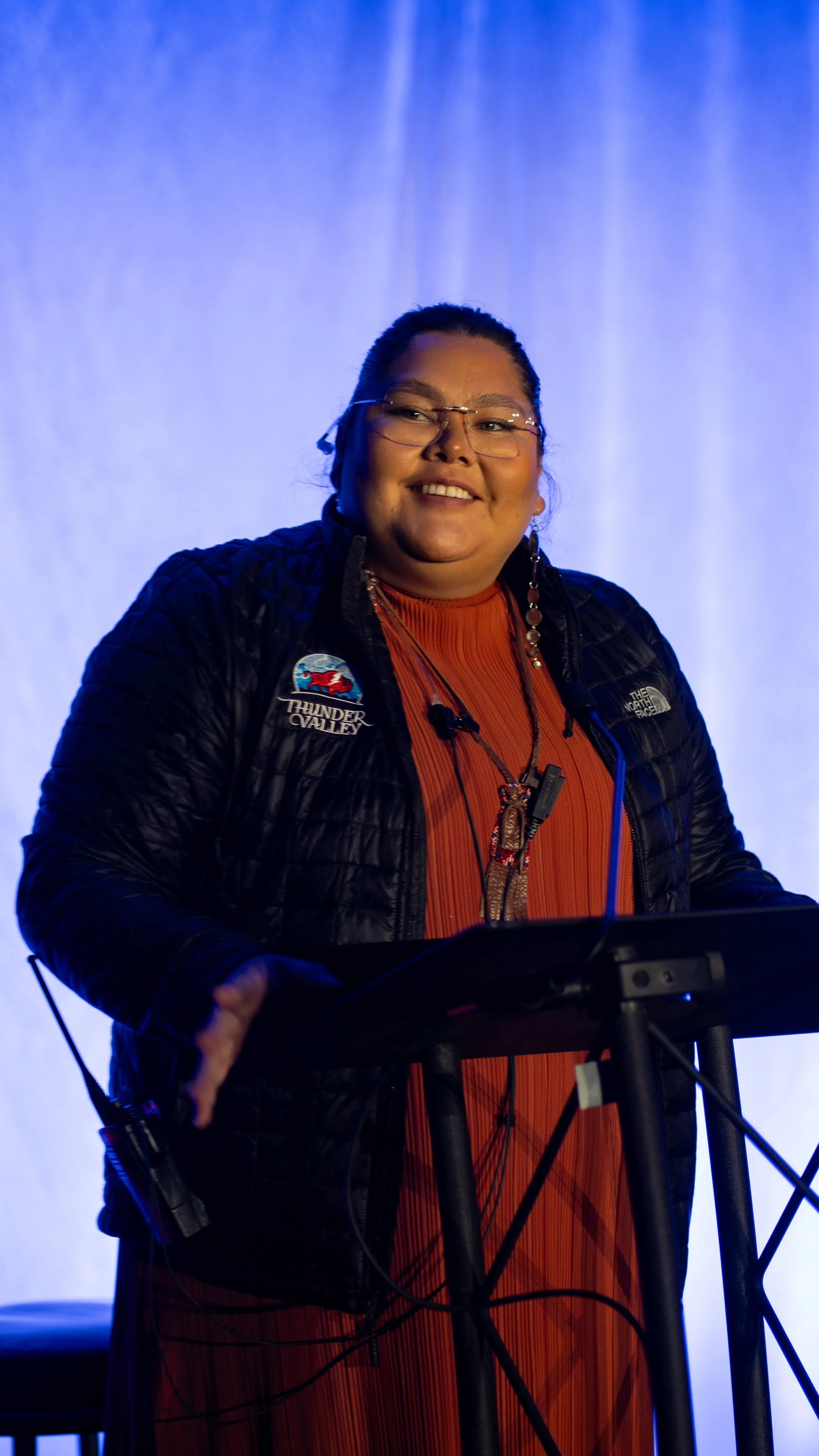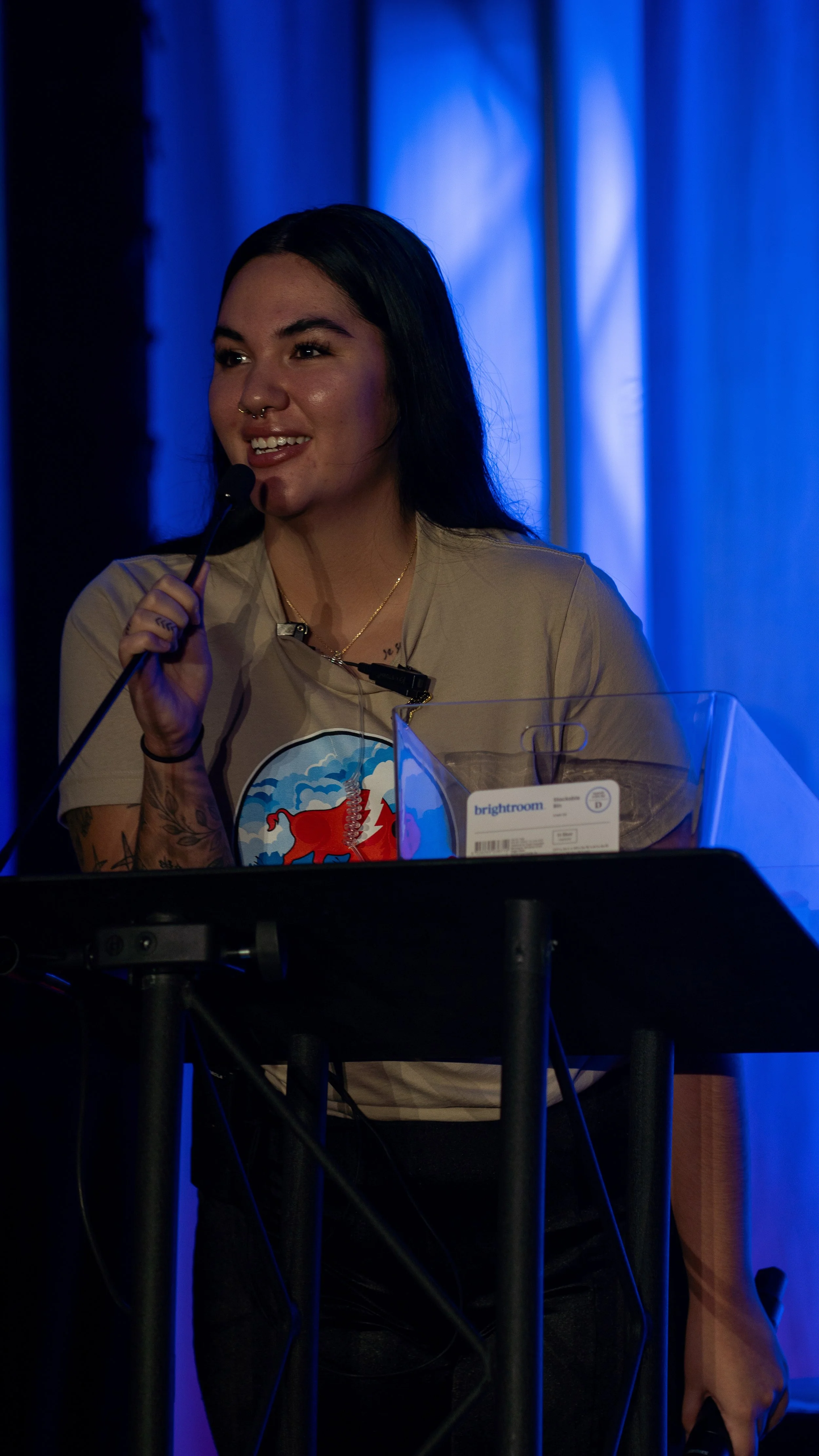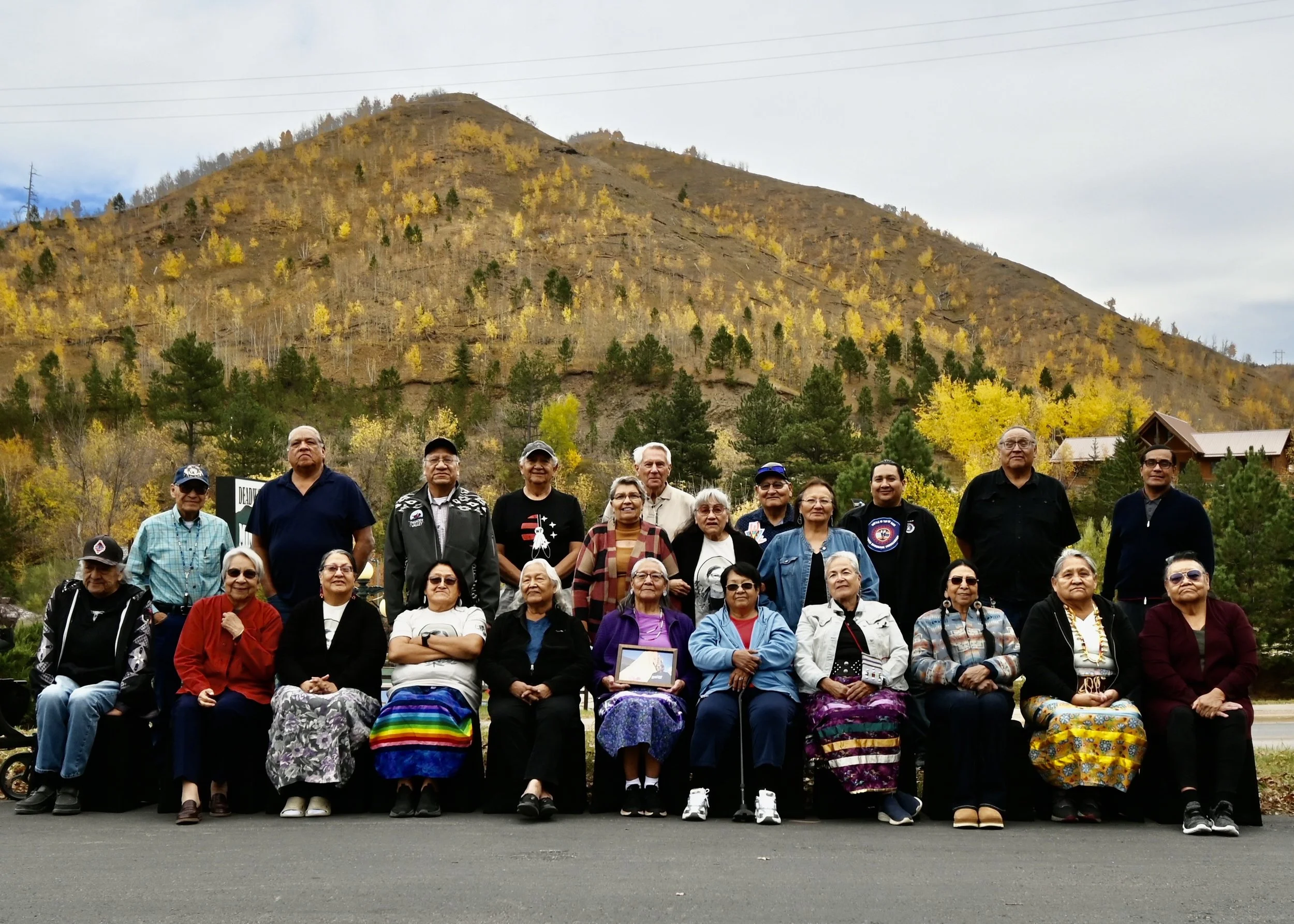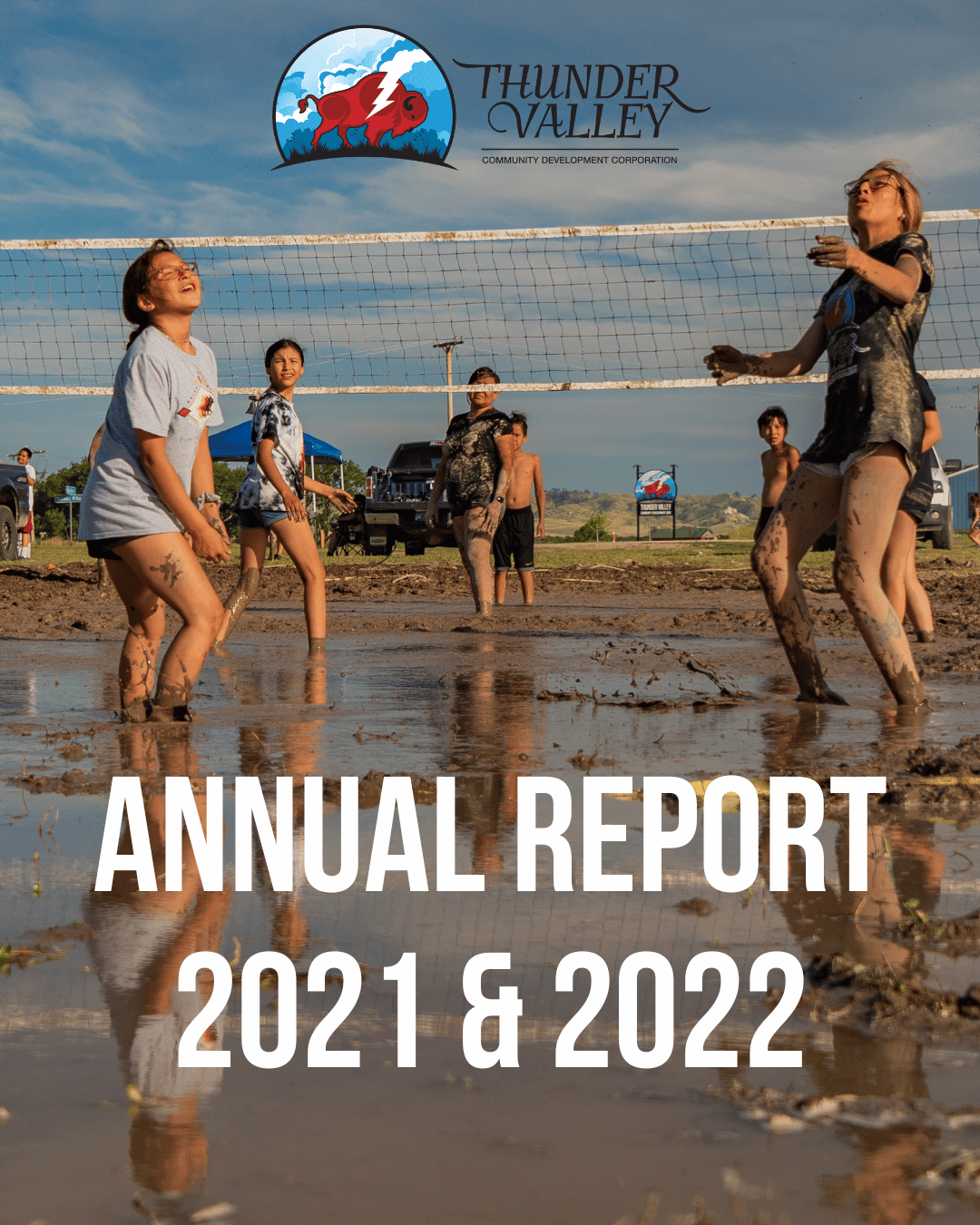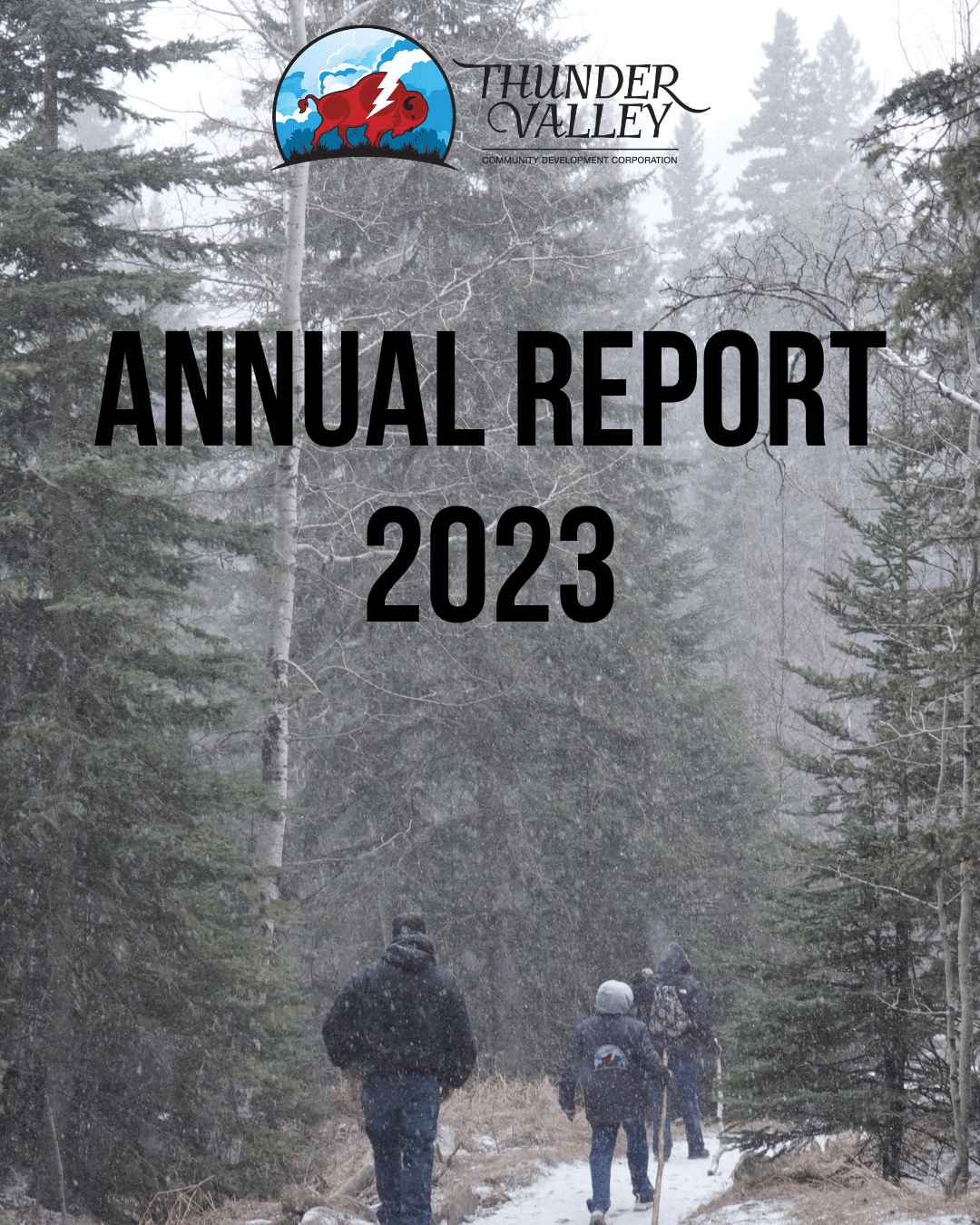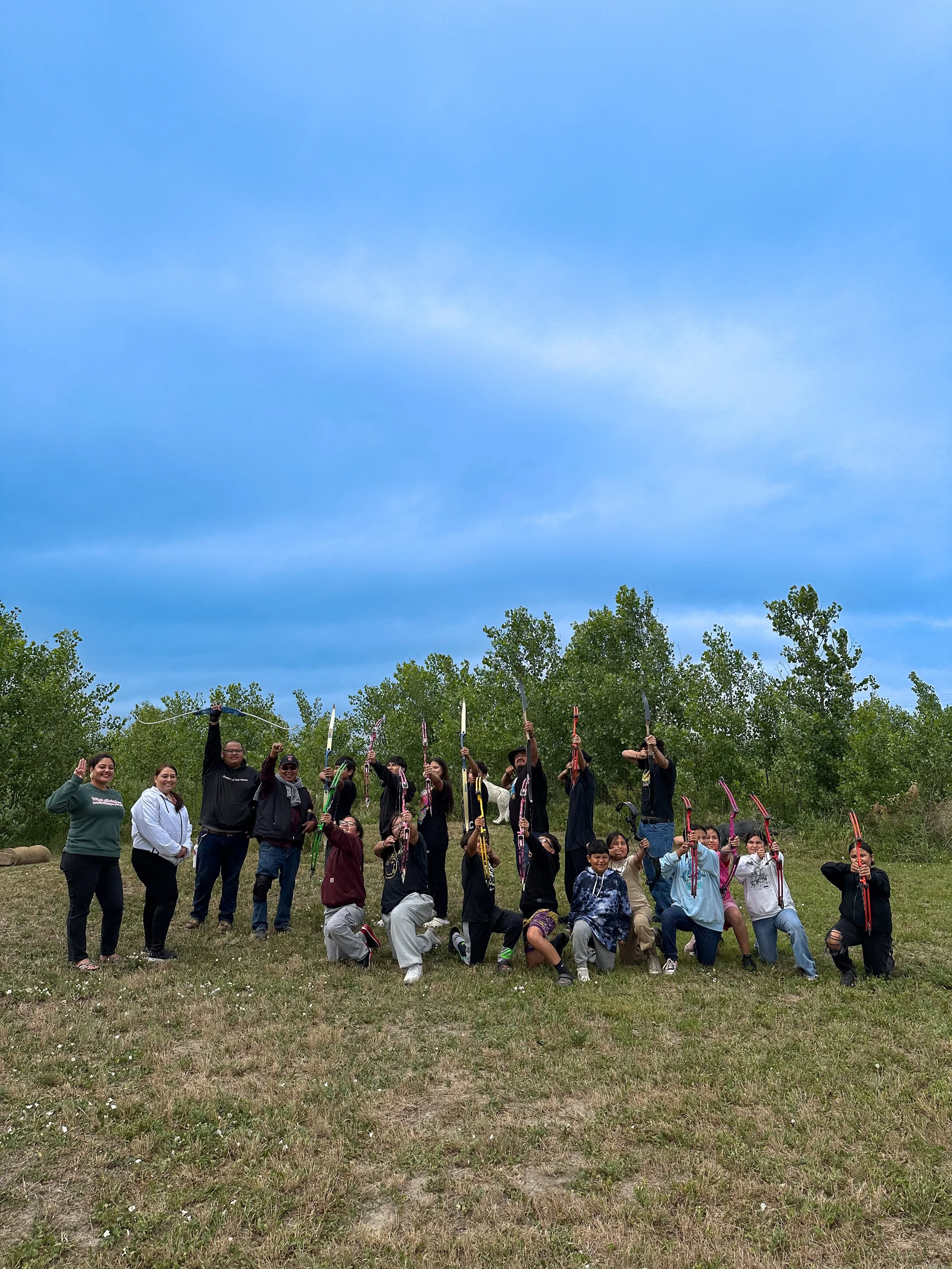
annual report 2024
Walking the path of Healing, hope and Liberation

Mitakuyepi,
Last year was a year of transitions for Thunder Valley Community Development Corporation. As our previous strategic plan came to an end, we worked with our staff and consultants to create a Long Arc Strategic Plan: Looking seven generations toward the horizon, we see what steps we need to take today for our children and grandchildren. This type of thinking is perfectly aligned with our Lakota worldview, as we make our decisions based on what type of world we want to give our future generations. Taking the long view helps ensure that we are not chasing fads or putting our energy and resources in the wrong areas.
Many of the changes in this strategic planning have been to broaden our scope and expand our scale. Our Food Sovereignty Initiative was renamed Lakota Land Systems, as their work is growing to focus on improving ecology and land systems. For years, while working to acquire land for our buffalo herd, our staff have been visiting herds around the region to see different practices to care for these relatives. By tending these relatives, we will heal our relationships with them, regenerate the ground beneath their feet and demonstrate the positive impact of Indigenous land stewardship.
In addition, we created a new initiative called the Lakota Advocacy Center, which works to improve the land by cultivating an ethos of stewardship within our community and developing tools for our people to change the landscape for what they want. This work is organized around three pillars: Women's Equity, Climate Change and Plant Sovereignty.
In addition to growing and creating this new team, we did sunset two of our initiatives: Social Enterprise and Housing & Homeownership. This was a difficult decision, but ultimately, between our Long Arc Strategy and our community engagement in the development of this new strategic plan, we saw that our people's priorities were better served by refocusing our efforts in other areas. Our former Social Enterprise Director, Doyle Pipe on Head, has moved to our Lakota Lifeways and Wellness Equity team, where his expertise is used to contribute to our new program centered on Horses and Healing.
2024 in Review:
At the end of the year, I was appointed by our board to serve as interim Executive Director, then on February 4, 2025 was made permanent after a competitive selection process. In my six years here at Thunder Valley as Deputy Director, I oversaw the majority of our initiatives and came to deeply understand the work of our team. When I decided to apply for the permanent role as Executive Director, I shared with them a vision of shared leadership that would better unite the staff doing the work with our board of directors. This shared leadership model is more aligned with our traditional lifeways, and I believe that the best way to serve our community is by combining expertise in a team of decision makers.
Our work is driven by the needs of the community, with a strong focus on youth. This work embodies a unique spirit that we honor by approaching it with sincerity, love and care. These guiding principles have always influenced my efforts across various fields, including education, health, wellness, culture and the arts.
In the current political climate, people are rightly worried. Nationally, they're concerned that programs they rely on may be cut, that people they love will be targeted. And all over the world, people are looking to Indigenous communities for leadership because we have survived and thrived despite the efforts of hundreds of Donald Trumps. I am humbled to be one of the leaders of Thunder Valley and to share our wisdom and strategies with the ever-growing community,
Please continue reading to learn about the incredible work of our team in 2024 and how we are making our path to our liberated horizon.
Aŋp̄et̄u k̄iŋ le t̄aŋyaŋ mani ye (walk well today),
Lynn Cuny
An artist and experienced nonprofit leader, Chief Executive Officer Lynn Cuny is an enrolled member of the Crow Creek Sioux Tribe (Hunkpati Dakota) and Oglala Lakota. She is committed to the progress of building opportunities, the movement of systematic change and the sustainability of TVCDC community.

Youth Leadership Development
As Lakota, our two greatest strengths are our youth and our spirituality. Our Youth Leadership Development Initiative focuses on connecting our youth to our spirituality, providing them the opportunities to grow and learn who they want to be. Our programming ranges from arts and crafts to traditional ceremonies and teachings to sports and games. We provide holistic programming to ensure that we can offer something for every child in our community, whatever their interests.
In 2024, we hosted leadership and cultural camps, healing camps, a basketball tournament, summer programming, archery events, coming of age ceremonies for both girls and boys, runs and photography classes.
We are proudest of our cultural programming, because helping our youth reconnect with our traditional Lifeways helps them to thrive in a safe, positive environment, strengthen their sense of identity and feel a deep belonging that comes from being embraced in community. Two of the most important ways we foster this are our healing camps and our support for the students in the Pine Ridge School dorms. Our camps hosted 17 young ladies and 15 young men and included teachings about traditional plants as foods and medicines, as well as preparing for and hosting coming of age ceremonies. In our support for the Pine Ridge School dorm students, we helped rebuild a sweatlodge and began hosting weekly sweats to foster social and spiritual connectedness. Both programs support our youth’s spiritual growth and provide communities to support them as they learn and grow.
Part of the effort to expand access to our traditional lifeways has been continuing to host weekly Boys Society meetings in two communities. These sessions provide crucial teachings while fostering connections and friendship between the boys and group mentors.
2024 was the first full year Amia Moore led our Youth Leadership Initiative. With 20 years of experience serving tribal communities, Amia is a dedicated advocate for mental health, higher education and cultural identity as essential pathways to resilience and healing. She is proud to have the opportunity to use the skills she has developed to directly serve her community.
Lakota Language & Education
2024 Child Honoring
At the end of our school year, we honored our children for their learning throughout the year, saying toksa akhe (we’ll see you again) to those moving to new classrooms! Honorings like this recognize their growth and remind them that a whole community of adults is eager to celebrate their success
Our Lakota Language and Education Initiative works to revitalize our language and lifeways through our Lakota Immersion Montessori classrooms, designing programs and curriculum for adult learners, contributing to research on Indigenous communication practices and working with a community of elders to enhance the transmission of knowledge between generations.
Students in our classrooms participated in several sacred site visits and learned about our traditional plant medicines by attending harvesting events with our team. At the end of each school year, we celebrate our students with an honoring ceremony. In preparation for the ceremony this year, staff and parent volunteers helped make regalia for the children being honored. Giving these gifts shows our children that they are loved by our full community, and gives them hand-made symbols of that love.
Beyond our classrooms, we supported youth language learning by recording and transcribing stories to support development of a second season for Uŋc̄i Wiċooyak̄e (Grandmother Stories), an app developed in collaboration with the Lu Brothers to provide children the opportunity to play in our language while learning our traditional stories.
In addition to the youth programming, our organization officially adopted the White Hat orthography for writing in our Lakota language. This writing system was developed by a Lakota elder in relationship with other fluent speakers, and better reflects the values of our community.
Our Lakota Language and Education staff are supported on their language learning journey with dedicated time every week to focus on learning. Our Language Reclamation Coordinator, Rose Rosales, works with everyone on our team to support their Individual Learning Plans. These plans help to meet people where they are and have significantly improved the fluency of our classroom staff, providing direct support to our students and the health of our language.
Emmy Her Many Horses is our Lakota Language & Education Director. She leads our Language Immersion Montessori classrooms, utilizing experience from years teaching Dakota to children, adults, and intergenerational groups. Beyond education, she has worked at nonprofits serving Native youth and communities by managing initiatives and developing curriculum.
Shawnta’ Jones, our Director of School Design and Curriculum, plays a vital role in organizing our Elder Retreats and designing programming to gather, preserve and incorporate stories shared into our Lakota Immersion Montessori curriculum and school environment. Her work ensures that the intergenerational transfer of knowledge is not only embedded in what we teach but also reflected in how our learning spaces are designed, centering Lakota values, fostering cultural continuity and surrounding our youngest relatives with the wisdom and love of our elders in both form and function.
Lakota Advocacy Center
Thunder Valley's newest initiative, the Lakota Advocacy Center, emerges as an evolution of our former Community Engagement Team. This shift reflects a deeper commitment to organizing with and for our Oyate–our people. Led by DeCora Hawk, who has been with Thunder Valley for nearly seven years, the Center ensures our organizational work remains aligned with community vision and priorities.
During her tenure, DeCora led our pandemic response, mobilizing in-person and virtual efforts to connect relatives with material, social and spiritual support. Through the coordinated leadership of Lakota women, we distributed over 7,000 care packages to elders and youth across the Reservation.
Building on this foundation the Lakota Advocacy Center has three primary focuses: Climate Justice, Plant Sovereignty and Women's Equity.
As Indigenous people, we are on the frontlines of climate change. Though we contribute little to the forces causing ecological harm, our communities face some of its most devastating impacts. In response, one of our key strategies is Plant Sovereignty–reclaiming our traditional harvesting, medicinal and sustainability practices. These practices ensure that our children and grandchildren can access and understand these vital medicines for generations to come.
Our work of Reclaiming our Responsibility as land stewards is rooted in our spiritual calendar, which we are building alongside the expanding Women's Equity Movement. This movement evolved from the same network of Lakota women leaders who responded to Covid-19. Today we are leading efforts to restore the traditional role of women as leaders in our communities–laying the foundation of healing, safety and an end to the epidemic of violence against Indigenous women and girls.
DeCora Hawk, Lakota Advocacy Center Director
Lifeways & Wellness Equity
The work of all our initiatives is guided by our Lifeways and Wellness Equity team, which serves to connect this work with our community. By restoring and teaching our traditional wot̄ak̄uye (kinship) system, they are cultivating the relational worldview that has always guided our people. Their work is shared through curriculum development and presentations to our staff, as well as by hosting and contributing to various events. Throughout 2024, the team rolled out a spiritual calendar based on our traditional annual journey through our homelands and used that to guide the timing of sacred site visits. On these visits, we shared traditional stories and teachings related to the stories and histories of our people and our home.
One point of connection with the broader community has been regular hand drum contests. Hosted over the last three years, these contests have grown to the point where last year’s hosted around 180 people for this traditional event, with 20 groups competing. Singing traditional songs and sharing space for these contests strengthens our community connectedness to each other and to our lifeways. The popularity and sustained growth of this event shows that our people are excited to come together and share these traditional practices.
Lakota Land Systems
As a part of our Long Arc Strategic Planning, our Food Sovereignty work evolved to focus on the larger systemic challenges contributing to our local food desert and food insecurity; the access to land, growing our own food source and ensuring our food stays at home.
In 2024 we launched our Lakota Land Systems (LLS) Initiative. LLS aims to improve the holistic well-being of Pine Ridge Reservation community members and their ancestral homelands through its focal areas of hands-on, ecological and buffalo herd monitoring, educational programing, narrative change and advocacy work.
After nearly three years of planning and working with the Oglala Sioux Tribe, we made history by securing a groundbreaking 25-year lease from the Tribe for 39,904 acres of former grasslands located within the Stronghold in 2023. This vast expanse of land will be the foundation of Thunder Valley CDC’s Stronghold Buffalo Range Project. This transformative initiative is a once-in-a-generation opportunity to bring our buffalo relatives back to their original home and restore the ecosystems that sustained them and our Oglala Lakota people since time immemorial.
In addition to our buffalo restoration, we are in the progress of identifying and acquiring land to grow traditional trees, including chokecherry, buffalo berry and wild plums. In addition to their spiritual, medicinal and culinary uses, the trees provide shelter for small animals from the sun and the wind. We have grown these trees for years in the demonstration farm on our development and look forward to growing more to provide them to our community.
Regenerative community development
At Thunder Valley, we are building a community from the ground up. Design and planning, as well as construction project management, is led by this initiative. They work to heal our relationships with Uŋc̄i Mak̇a (Grandmother Earth), our built environment and all the living things around us. In addition to our office space, we have built 21 single family homes, a 12-unit apartment building and a community center that creates opportunities for community gatherings. In 2024, this initiative worked with buyers to sell two more houses, which now are homes to two families.
Our Project Manager, Blake White, coordinated the purchase and installation of a new building for our Lakota Language & Education initiative. This building will allow our initiative to serve 33 students, up from 18 in the school year that began in 2024. As our organization, staff and services grow, it is the Regenerative Community Development Initiative that ensures our space serves the needs of our staff and our community.
The above design is a mural painted by Billy Janis on our pole barn to honor Tessa LeBeaux, the Unci and matriarch whose community caretaking inspired the creation of our organization and continues to guide our work

Our Workforce Development Initiative completed its 9th Cohort in 2024, with five participants. The program provides a holistic approach for a young adult to become the most hirable employee. Hard skill development included various construction training opportunities. Soft skills, such as resumes and interview preparation. Social and emotional support included teachings with our Lifeway & Wellness Equity staff. Each year, program participants are invited to our sacred site visits. Visiting these historic places, learning their stories and helping with spiritual practices, our young relatives grow in their connection to both our community and our spirituality.
Workforce Development
With this year's team-wide reorganization and staffing changes, the cohort rotated between our other initiatives. This arrangement gave them a more exhaustive overview of our organization and allowed them to support our work in many ways.
As we work to build our buffalo herd, Workforce Development participants will receive training to rebuild themselves as true stewards of the land, and being a good relative with an emphasis on the buffalo. In addition to providing valuable experience, this helps restore one of the relationships that traditionally sustained our people and ensures a growing workforce that's equipped to work with our buffalo relatives.
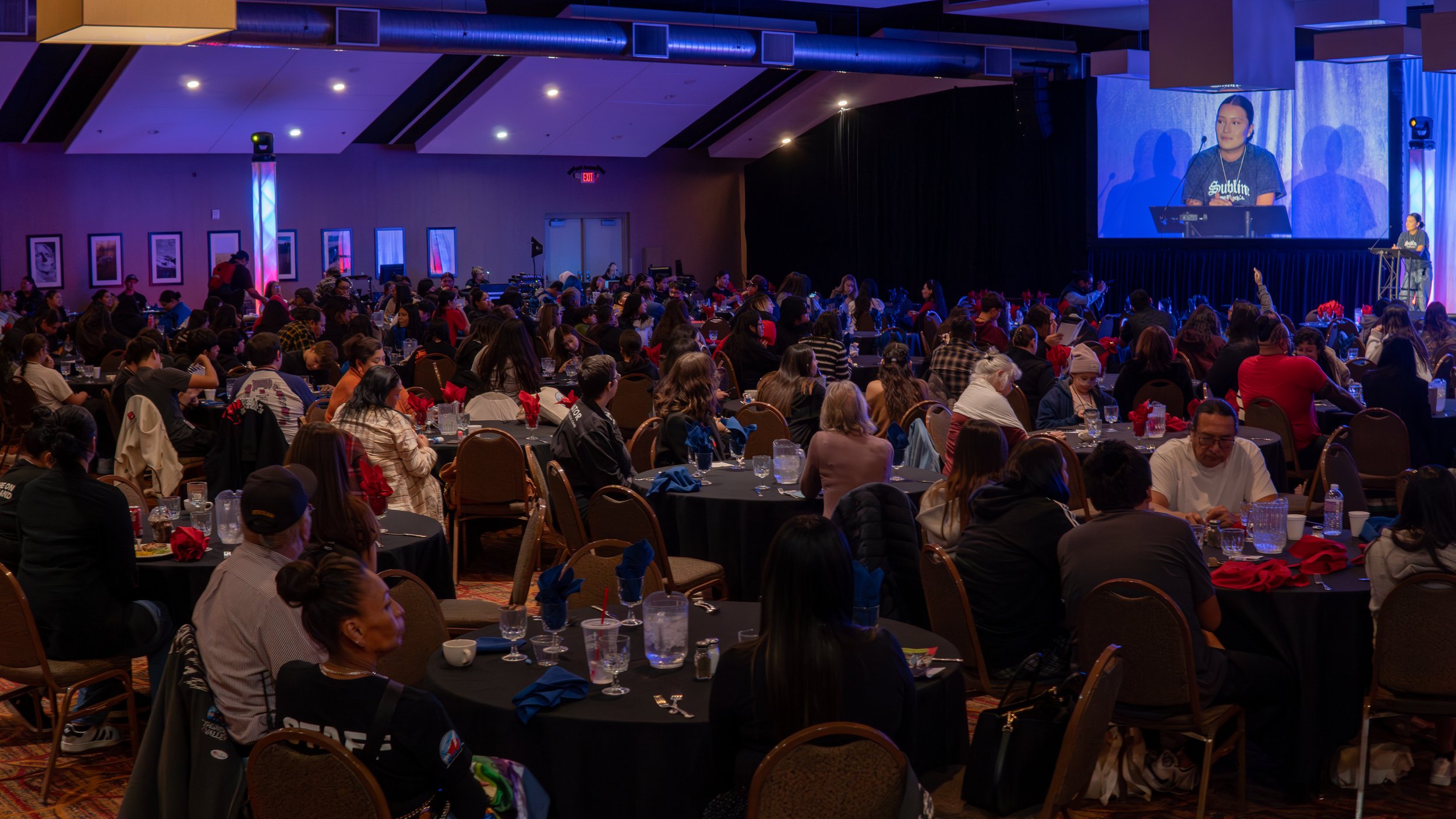
Liberation Summit
From Resilience to Revolution to Restoration
In 2024, Thunder Valley Community Development Corporation hosted the first Liberation Summit–a powerful convergence of movements rooted in sovereignty, creativity, and connection. The summit brought together our previous Food Sovereignty and Lakota Media Summits, while expanding to include language revitalization and youth leadership. This intersectional gathering welcomed over 400 participants including community leaders, nonprofit professionals, chefs, comedians, and school groups who came together to learn from one another, share meals, and build networks for sustained action.
Planning and executing an event of this scale is no small feat–many organizations would have brought in external teams to carry the load. Being the largest event Thunder Valley has hosted, this intersectional summit relied heavily on directors from several initiatives, and the success is owed to the collaboration of our Lakota Advocacy Center, Lakota Land Systems, Lakota Language and Education, and Youth Leadership Development teams. The summit's planning and operation was led by DeCora Hawk, Lakota Advocacy Center Director, whose vision and determination created space that centered community voices–especially our youth.
Additionally, Isabella LeBeaux played a critical role in ensuring that youth were not only included, but prioritized. Her position works with both our Lakota Advocacy and Youth Leadership teams. She coordinated with 11 schools across the Pine Ridge Reservation, resulting in over 159 youth participants–a presence that infused the summit with energy, creativity, and future vision.
We extend our deepest gratitude to every speaker, attendee, and sponsor who made this possible. Events like this remind us: nothing meaningful is ever done alone. We are proud to have such a strong and committed community.
DeCora Hawk, Lakota Advocacy Director, led the planning and success of the first Liberation Summit
Above (left to right): Gemma Lockhart, Jillian Waln, AmyRose Foll, and Alvera Sargent spoke as a panel exploring their intersections between their work in media, language revitalization, and Indigenous land stewardship
Above: Isabella LeBeaux led our outreach to the schools on our Reservation, which sent a combined 159 students
Right: Tonia Jo Hall as Aunty Beachress at the Comedy Night, hosted November 7
2024 elder retreat
In October, we hosted our third Elder Retreat in Deadwood, South Dakota. We started hosting these spaces after a group of elders–led by Beverly Running Bear and Velma Kills Back–requested our logistical support in bringing together elders. These spaces are especially vital now, as many of our elders are first language speakers and with each passing day, we risk losing not only them but the deep knowledge and language that they carry. We are proud to provide these rare opportunities for conversation to flow in our language.
We aim to reclaim Lakota educational sovereignty by building a system deeply rooted in our language, lifeways and worldviews. Elder Retreats have become a crucial part of our curriculum development. Through small and large group sessions that incorporate multiple modes of expression such as speaking, writing, song and storytelling, as well as individual reflection, the Elders engage in a process that centers Lakota ways of knowing. Each day allows space for them to reflect on key milestones throughout their lives, highlighting our history, philosophy and perspective. One of the really consistent things we have found is that our Uŋc̄is and Kakas (grandmothers and grandfathers) grew up around horses. With this and other considerations, we are working to expand our use of horse therapy from a part of our Workforce Development programming to a core part of our organization for both staff and community members.
The 2024 Elder Retreat did a lot to help reveal our curriculum, as we developed our 13-moon spiritual calendar and more fully documented our shared responsibilities by centering their biographies over more conventional historical approaches. It is our hope that these shared experiences and insights will serve as the foundation for developing an educational framework that becomes the heart of Lakota education. Though, the success was not perfect, as many elders told us that we should have provided more soup!

Better Way Foundation
Black Hills Area Community Foundation
Builders Initiative
Doris Duke Charitable Foundation
Kataly Foundation
National Fish and Wildlife Foundation
Northwest Area Foundation
Oglala Sioux Tribe
Pawanka Fund
Regional Plan Association
Robert Wood Johnson Foundation
Serena Foundation
The Solutions Project
Urban Native Era
World Wildlife Fund
Yocha Dehe Wintun Nation
sustaining Supporters
Wopila ṫaŋk̄a uŋk̄enic̄iyap̄i kṡt̄o (we thank each of you)!
